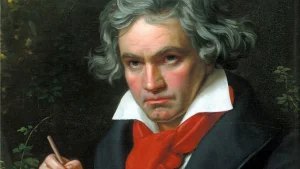1. Biography of a genius in fast-forward mode
The exact date of birth of Beethoven (Ludwig van Beethoven) is the first of the mysteries of his biography. Only the day of his christening is precisely known: December 17, 1770 in Bonn. As a child, he learned to play the piano, organ and violin. At the age of seven he gave his first concert (his father wanted to make a “second Mozart” out of Ludwig).
At age 12, Beethoven began writing his first compositions with funny titles like “Elegy on the Death of a Poodle” (presumably inspired by the death of a real dog). At the age of 22, the composer left for Vienna, where he lived until the end of his life. He died on March 26, 1827 at the age of 56, presumably from cirrhosis of the liver.

2. “Fur Elise”: Beethoven and the fair sex
And this topic is surrounded by mysteries. The fact is that Beethoven never married. But he repeatedly wooed – in particular, to the singer Elisabeth Röckel, to whom, as the German musicologist Klaus Kopitz believes, the famous A-minor bagatelle “To Elise” is dedicated) and pianist Teresa Malfatti. About who the unknown heroine of the famous letter “to the immortal beloved” was, scientists also argue, converging on the candidacy of Anthony Brentano (Antonie Brentano) as the most real. We will never know the truth: Beethoven carefully concealed the circumstances of his personal life. But a close friend of the composer, Franz Gerhard Wegeler, testified: “During the years of his life in Vienna, Beethoven was constantly in a love relationship.”
3. A difficult person in everyday life
An unempty chamber pot under the piano, leftovers among the scores, disheveled hair and a worn dressing gown – and this, too, judging by numerous testimonies, was Beethoven. A cheerful young man, with age and under the influence of ailments, turned into a rather difficult character in everyday use.
In his “Heiligenstadt Testament”, written in a state of shock from the realization of impending deafness, Beethoven points to illness as the reason for his bad character: “Oh, you people who consider me malicious, stubborn or misanthropic – how unfair you are to me, because you you don’t know the secret reason for what you think. For six years now I have been in a hopeless condition, aggravated by ignorant doctors … ”
4. Beethoven and the classics
Beethoven is the last of the titans of the “Viennese classics”. In total, he left more than 240 compositions to posterity, including nine completed symphonies, five piano concertos and 18 string quartets. He essentially reinvented the genre of the symphony, in particular, using the choir for the first time in the Ninth Symphony, which no one had done before him.
5. The only opera
Beethoven wrote only one opera, Fidelio. Work on it was given to the composer painfully, and the result still convinces not everyone. In the operatic field, Beethoven, as Russian musicologist Larisa Kirillina points out, entered into polemics with his idol and predecessor – Wolfgang Amadeus Mozart (Wolfgang Amadeus Mozart).
“Beethoven composes”: painting by Karl Schlösser appeared already at the end of the 19th centuryPhoto: picture-alliance / akg-images
At the same time, as Kirillina points out, “the concept of Fidelio is directly opposite to Mozart’s: love is not a blind elemental force, but a moral duty that requires readiness for a feat from its chosen ones. The original title of Beethoven’s opera, Leonora, or Conjugal Love, reflects this anti-Mozartian moral imperative: not “all women do this”, but “all women should do this”.
6. “Ta-ta-ta-taaaa!”
According to Beethoven’s first biographer Anton Schindler, the composer himself spoke of the opening bars of his Fifth Symphony: “So fate itself is knocking at the door!” A person closer to Beethoven, his student and friend, composer Carl Czerny, recalled that “Beethoven was inspired by the cry of a forest bird for the theme of the C-Moll symphony” … One way or another: the image of a “duel with fate” became part of Beethoven’s myth.

7. Ninth: symphony of symphonies
Beethoven’s Ninth Symphony, which premiered on May 7, 1824 in Vienna and was accompanied by a flurry of applause that the completely deaf composer could not hear, is still an unsurpassed work in the history of music. “Ode to Joy” to the verses of Schiller (Friedrich Schiller) became the anthem of a united Europe.
An interesting fact: when the technology of recording music on CDs was invented, it was the duration of the Ninth Symphony (over 70 minutes) that determined the parameters of the new format.
8. Beethoven and the Revolution
The radical nature of Beethoven’s ideas about the role and significance of art in general and music in particular made him an idol of various revolutions, including social ones. The composer himself led a completely bourgeois lifestyle.
9. Fisted Star: Beethoven and Money
Beethoven was already a recognized genius during his lifetime and never suffered from a lack of conceit. This was reflected, in particular, in his ideas about the amount of fees. Beethoven willingly accepts small orders from generous and influential patrons, and sometimes negotiated with publishers in a very tough tone. The composer was not a millionaire, but a very wealthy man by the standards of his era.
10. Deaf composer
Beethoven began deafening at the age of 27. The disease developed over two decades and completely deafened the composer by the age of 48. The latest research proves that the cause was typhus, a common infection in Beethoven’s time, which is often carried by rats. However, with absolute inner hearing, Beethoven could compose music even when he was deaf. Until the last years of his life, he did not leave desperate – and, alas, fruitless – attempts to restore his hearing.
